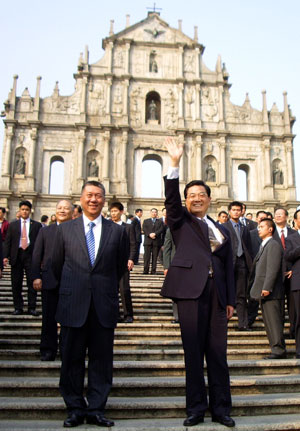|
"One country, two systems" works in Macao
By Xing Zhigang (China Daily)
Updated: 2004-12-19 23:44
President Hu Jintao yesterday spoke highly of the successful "one country,
two systems" policy in the Macao Special Administrative Region (SAR) over the
past five years.

Chinese President
Hu Jintao (R) and local leader Edmund Ho attend the completion ceremony of
the Sai Van Bridge in Macau December 19, 2004.
[xinhua] |
He praised the people of Macao for
closing ranks and working hard to open a new chapter in local history.
The principles of "Macao people administering Macao" and a high degree of
autonomy have been fully implemented since Macao's return to the motherland, he
said.
Under the leadership of the SAR government headed by Chief Executive Edmund
Ho Hau Wah, the territory has developed a harmonious society and sustainable
economic growth.
The vitality in Macao "offers compelling evidence that our policy of 'one
country, two systems' is a fundamental guarantee of Macao's sustainable
development and long-term prosperity and stability," the president said.
|

China's President Hu Jintao (R) and Macau
Chief Executive Edmund Ho visit the Ruins of St. Paul, a landmark monument
to Christianity in the East, in Macau December 19, 2004. Hu will attend
the celebrations of the Macau's fifth anniversary after return to Chinese
rule in December 20. [Reuters]
|
"It shows
that the Macao people have the wisdom, ability and means to properly administer,
build and develop Macao."
He made the remarks at a welcoming banquet to mark the fifth anniversary of
the founding of the Macao SAR on December 20, 1999.
The banquet was hosted by the SAR government at the Macao Tower Convention
and Entertainment Centre yesterday evening.
Hu arrived here yesterday morning to attend the anniversary celebrations and
the inauguration ceremony of the second-term Macao SAR government. This has been
his first visit to the SAR with an area of 27.3 square kilometres and a
population of around 460,000.
To boost Macao's development, the president vowed to unswervingly follow the
principle of "one country, two systems" while upholding the authority of the
Macao Basic Law, the region's mini-constitution.
"Strong support will be given to the Macao SAR government in its efforts to
develop the economy, improve the people's livelihood and maintain stability," he
told the event.
As one of China's two SARs, Macao's unprecedented economic prosperity is in
sharp contrast with four consecutive years of negative growth before 1999 under
the Portuguese rule.

President Hu waves
as landing in Macao for celebrations marking the fifth anniversary of its
return. [Reuters] | Official statistics suggest that Macao's GDP grew 30 per cent from 49 billion
patacas (US$6.1 billion) in 1999 to 63.37 billion patacas (US$ 7.9 billion) last
year, with the per capita GDP up by 24 per cent from US$14,300 to US$17,800 in
the same period.
The fast development of Macao has been closely linked with the mainland's
great economic achievements, Hu said.
He expressed his confidence that further progress in China's reform,
opening-up and modernization drive will provide stronger impetus, greater
opportunities and broader horizon for Macao's development.
Chief Executive Edmund Ho addressed the feast followed by an arts
performance, saying Macao has achieved initial success in implementing the
policy of "one country, two systems."
He stressed that the all-out support from the central government and the
entire nation greatly contributed to Macao's success.
Hu in close touch with Macao people
Amid his heavy schedule, President Hu launched a charm offensive by putting
his best foot forward as "man of the people."
He worked to get close with ordinary people by visiting a local workers'
children school and the family of Zheng Bingkun, a 53-year-old bus driver.
Even when he took a short tour of the city for a taste of its unique and
strong European heritage, the Chinese leader impressed local residents and
tourists with his friendly greetings and wide smiles.
During his visit to the St. Paul's Ruins, a magnificent stone facade and
grand staircase left over from the St. Paul's Church, he walked down the long
stairs to shake hands with local residents.
"We can feel his cordial and friendly attitude towards us," said a woman
surnamed Chan.
Hu also visited the Museum of Macao, with a great number of collections
showing how Eastern and Western cultures have lived side by side in Macao for
centuries, and Monte Fort, built in 1617-26.
Before the sightseeing tour, President Hu also attended the completion
ceremony of Sai Van Bridge, the city's third bridge linking the Macao Peninsula
to the outlying Taipa Island. He cut the ribbon at the inauguration of the
bridge.
The 2.2-kilometre-long bridge has been the largest public project since Macao
returned to the motherland.
The cable-stayed bridge starts at the Sai Van Lake on the Macao Peninsula.
Designed with double deck carriageways, the bridge is the world's first
pylon-type design bridge.
The bridge is designed with M-shaped archs, the initial of Macao.
Construction of the bridge started in 2002. The double-deck design allows six
lanes in the upper layer and four lanes in the lower, which is shut down most
days and opens only when a typhoon hits the city.
It has also left room for the installation of a light rail.
| |
 |
|
 |
|
|
Today's
Top News |
|
|
|
Top China
News |
 |
|
 |
|
|
|
|
|
|